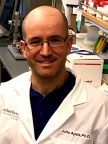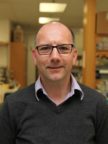Primary Faculty Research Labs
This is an alphabetical list of tenure-track and tenured faculty with primary appointments in MPB and active research labs
Primary Faculty Research Labs
Assistant Professor, Molecular Physiology and Biophysics
The Arrojo e Drigo lab focuses on understanding the mechanisms regulating post-mitotic cell homeostasis and longevity. Many post-mitotic cells can be as old as the organism, which makes them remarkably long-lived. We study long-lived cells in different organs and explore their developmental trajectory, structure-function and aging patterns. Our lab uses a combination of single cell sequencing and high-resolution light, electron and isotope microscopy platforms to overlay cell structure-function with molecular identity, age and metabolism.
: 718 Light Hall
- : r.drigo@Vanderbilt.Edu
- : https://lab.vanderbilt.edu/drigo-lab/
Associate Professor, Molecular Physiology and Biophysics
Research in the Ayala lab focuses on gut-brain interactions that regulate energy balance. Specifically, we are interested in identifying regions in the central nervous system and molecular mechanisms within those regions that mediate the effects of the gut hormone Glucagon-like peptide-1 (Glp1) and related Glp1 receptor (Glp1r) agonists on feeding behavior. Our lab combines transgenic mouse models, targeted pharmacological interventions and state-of-the-art metabolic phenotyping capabilities to address research questions. We aim to extend the technical expertise in the lab to leverage the existing imaging, circuit mapping, electrophysiology and behavioral phenotyping capabilities at Vanderbilt. Other projects in the lab focus on leveraging biochemical and pharmacological properties of the Glp1r towards the design of more effective therapeutics for obesity and diabetes
: 813 Light Hall
- : julio.e.ayala@vanderbilt.edu
Chair of the Department of Molecular Physiology and Biophysics
Professor, Molecular Physiology and Biophysics
Joe C. Davis Chair in Biomedical Science
: 711 Light Hall
2215 Garland Ave
Nashville, Tennessee - 37232-0615: 707F Light Hall
2215 Garland Ave
Nashville, Tennessee - 37232-0615- : nancy.carrasco@vanderbilt.edu
- : 615-343-3694
Professor, Molecular Physiology & Biophysics
Genetic basis of susceptibility to type 2 diabetes.
: 735B Light Hall
- : wenbiao.chen@vanderbilt.edu
- : (615) 936-7390
Professor, Molecular Physiology and Biophysics
Jacquelyn A. Turner and Dr. Dorothy J. Turner Chair in Diabetes Research, Medicine
Diabetes, glycogenolysis, gluconeogenesis, physiology.
: 704A/710 Robinson Research Building
- : alan.cherrington@vanderbilt.edu
- : (615) 322-7013
Assistant Professor, Molecular Physiology and Biophysics
Research area: Structural biology and mechanisms of substrate catalysis, transport and inhibition in glucose and lipid metabolism mediated by PAP2 and MFS superfamily membrane proteins
: 746 Robinson Research Building (RRB)
- : derek.p.claxton@vanderbilt.edu
Assistant Professor, Molecular Physiology and Biophysics
Research in the Coate Laboratory seeks to identify mechanisms controlling the activity and identity of human pancreatic islet cells in health and disease. Our work relies heavily on the use of human cadaveric donor islets coupled with specific genetic targeting of alpha and beta cells, static and dynamic assessments of hormone secretion, bulk and single cell RNA-sequencing, chromatin profiling, immunocytochemistry, confocal microscopy, and transplantation of human islets into immunocompromised mice for in vivo studies.
: 8415 MRB IV
: 8425B MRB IV
- : kathryn.coate@vanderbilt.edu
- : 615-545-3562
- : https://lab.vanderbilt.edu/coate-lab/
Professor, Vice Chair, Molecular Physiology and Biophysics
Role of Ca2+/calmodulin-dependent protein kinase II (CaMKII) in normal synaptic signaling and in neuropsychiatric disorders.
: 724A Robinson Research Bldg (MRB1)
- : roger.colbran@vanderbilt.edu
- : (615) 936-1630
- : https://lab.vanderbilt.edu/colbran-lab/
Assistant Professor, Molecular Physiology and Biophysics
The Hinton Lab utilizes SBF-SEM and FIB-SEM to investigate the molecular mechanisms that regulate molecule transfer and morphology changes between the mitochondria and the endoplasmic reticulum and how these mechanisms are altered during pathophysiological states diabetes, obesity, and cardiovascular disease.
: 750 Robinson Research Building
- : antentor.o.hinton.jr@Vanderbilt.Edu
- : 615-322-2557
- : 319-383-3095
- : More Information/Publications
- : https://lab.vanderbilt.edu/hinton-lab/
Professor, Molecular Physiology and Biophysics
Secretagogue induced mechanisms regulating pancreatic islet electrical activity and hormone secretion
: 7425B MRB IV
- : david.a.jacobson@vanderbilt.edu
Associate Professor, Molecular Physiology and Biophysics
Structural Biology of Calcium Signaling and Transport through Biological Membranes
: 741A Light Hall
2215 Garland Avenue
Nashville, - 37232-0615- : erkan.karakas@vanderbilt.edu
- : 615-343-4494
Professor, Molecular Physiology and Biophysics
Computational and statistical genomics, Bioinformatics, Cancer genomics, Complex diseases, Genetics of psychiatric disorders
: 707 Light Hall
- : bingshan.li@vanderbilt.edu
- : (615) 343-2451
Professor, Molecular Physiology and Biophysics
Louise B. McGavock Chair and Professor, Medicine
Professor, Cell and Developmental Biology
Senior Associate Dean for Research-Designate
Pancreatic endocrine cell differentitation and dedifferentiation, reprogramming of pancreatic acinar cells into new beta cells, genetic and epigenetic regulation of cellular plasticity
: 9475 MRB IV
- : mark.magnuson@vanderbilt.edu
- : (615) 322-7006
- : https://lab.vanderbilt.edu/magnuson-lab
Professor, Molecular Physiology and Biophysics
Regulation Of Metabolic Response to Inflammation: Interaction With Nutrition
: 813C Light Hall
- : Owen.McGuinness@vanderbilt.edu
- : (615) 343-4473
- : https://labnodes.vanderbilt.edu/member/profile/id/10790
Professor, Louis B. McGavock Chair, Molecular Physiology and Biophysics
Structure and dynamic basis for protein function.
Professor, Molecular Physiology and Biophysics
Molecular and cellular biophysics of synapses
: 766 Robinson Research Building
- : terunaga.nakagawa@vanderbilt.edu
- : (615) 875-2531
Associate Professor, Molecular Physiology and Biophysics
Associate Professor, Biomedical Engineering
Associate Professor, Pharmacology
Quantitative and predictive understanding of dynamic signal transduction and gene regulation of the coding and the non-coding genome in model organisms and human disease.
For more information, please see our lab web site.
: 723 Light Hall
- : gregor.neuert@vanderbilt.edu
- : (615) 343-6404
- : https://lab.vanderbilt.edu/neuert-lab/
Professor, Director of Graduate Studies, Molecular Physiology and Biophysics
Diabetes and the Glucose-6-Phosphatase Gene Family
Assistant Professor , Molecular Physiology and Biophysics
Associate Professor, Molecular Physiology and Biophysics
Mitochondrial genetics and diseases. Toxicity mechanisms of HIV treatment. Pathogenesis of protein variations.
: 507B Light Hall
- : david.c.samuels@vanderbilt.edu
- : (615) 343-7870
Professor, Molecular Physiology and Biophysics
We study how environmental factors, such as nutrition and hormones, impact the development of neural circuits that control behavior and metabolism in order to better understand how early events in an individual’s life influence traits like feeding and metabolic physiology.
: 845B Light Hall
2215 Garland Avenue
Nashville, - 37232-0615- : richard.simerly@vanderbilt.edu
- : 615-322-7030
- : https://www.simerlylab.com
Mark Collie Chair in Diabetes Research, Molecular Physiology and Biophysics
Professor, Cell and Developmental Biology
Professor
Focused on defining the transcription factors involved in controlling the expression of Pdx-1 and MafA. In addition, we are examining how transcriptional factors influence beta cell formation and function.
: 8425C MRB IV
- : roland.stein@vanderbilt.edu
- : (615) 322-7026
- : https://lab.vanderbilt.edu/roland-stein-lab/
Assistant Professor, Molecular Physiology & Biophysics
The Wankowicz lab’s goal is to elucidate the role of entropy in substrate specificity and catalysis, aiming to provide a more comprehensive thermodynamic understanding of enzyme function. The influence of entropy is frequently underestimated because of the complexities in modeling multiple states and quantifying it. To achieve this, we develop computational algorithms to improve the modeling of conformational ensembles from X-ray crystallography and cryo-EM. We are parsing out how conformational and solvent entropy impacts binding specificity and catalysis using these improved models, biophysical measurements, and machine learning.
: 735 Light Hall
: 735B Light Hall
- : stephanie.wankowicz@vanderbilt.edu
- : http://wankowiczlab.com
Gordon A. Cain University Professor, Biomedical Engineering
A. B. Learned Professor of Living Physics, Molecular Physiology and Biophysics
Professor
Professor
Development and application of microdevices for instrumenting and controlling single living cells
: 6809 Stevenson Center
- : john.wikswo@vanderbilt.edu
- : (615) 343-4124
- : https://www.vanderbilt.edu/viibre/wikswo.php
Assistant Professor, Molecular Physiology and Biophysics
The Zaganjor laboratory investigates the role of mitochondrial function in cell fate decisions and the implications of this regulation in physiology. Importantly, we are focused on identifying how altered mitochondrial function leads to pathology.
: 754 Robinson Research Building
- : elma.zaganjor@Vanderbilt.Edu
- : https://lab.vanderbilt.edu/zaganjor-lab/
























